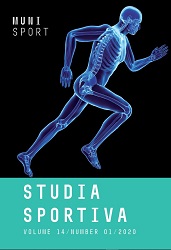Does personality matter when we are approaching the subjective perception of overtraining among adolescents?
Does personality matter when we are approaching the subjective perception of overtraining among adolescents?
Author(s): Radek Šíp, Iva BurešováSubject(s): Sports Studies
Published by: Masarykova univerzita nakladatelství
Keywords: Adolescence; personality; perfectionism; overtraining; sport
Summary/Abstract: This article deals with the issue of overtraining among elite adolescent athletes. The aim of our study was to examine the relationship between certain personality traits, as perfectionism, extraversion, neuroticism and other Big 5 traits and subjective perception of training load (which is one of the best indicator of overtraining syndrome). We also focused on the relationship between a perceived training difficulty and perceived training load too find out, if there is some kind of integral relationship. To collect data we used a questionnaire, which were given to adolescent elite athletes playing team sports in a mid-season period. The results show significant relationship between perceived training load and overall perfectionism (r=0.189, p<0.001), extraversion (r=-0.241, p<0.001), neuroticism (r=0.343, p<0.001) and consciousness (r=-0.287, p<0.001). After the closer examination we found an interesting relation between single dimension of perfectionism and perceived training load, suggesting the contribution of maladaptive perfectionism on development of overtraining syndrome. Besides that, we differentiated athletes into two groups, according to the level of perceived training difficulty. Those, who perceived training as difficult to exhausting (M=2,19, SD=0.50) were significantly higher than low to medium group (M=1.99, SD=0.47) in the perceived training load t(178)=-0.894, p=0.007. Those results extend our knowledge of overtraining topic and can be used in coaching practice to help identify athletes with higher risk of overtraining, or even prevent these states among young athletes before they occur. Hereby results suggest the importance of psychological aspects in sport preparation.
Journal: Studia sportiva
- Issue Year: 14/2020
- Issue No: 1
- Page Range: 58-66
- Page Count: 9
- Language: English

